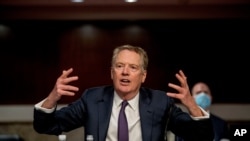Fifty Republican and Democratic senators signed a letter this week encouraging U.S. Trade Representative Robert Lighthizer to begin formal negotiations on a comprehensive trade agreement with Taiwan.
In the letter sent Thursday, the senators said, “As we look to advance our initiative for a free and open Indo-Pacific, we believe that now is the time to establish trade agreements with like-minded countries in the region.”
As tensions have risen between Washington and Beijing over coronavirus, trade, human rights issues and Chinese espionage, many lawmakers are looking to strengthen ties with Taiwan.
As one of the 11 largest U.S. trading partners, Taiwan contributed $76 billion to U.S. trade in goods and $18.5 billion in services in 2018, supporting an estimated 208,000 U.S. jobs, the U.S. lawmakers said in the letter.
They also stressed that, to achieve a free and open Indo-Pacific, U. S. needs to counter “China's use of unfair trading practices and other policies to advance its economic dominance in the region.”
“An agreement with Taiwan would help us accomplish this goal by building a network of like-minded governments dedicated to fair competition and open markets free from government manipulation and would serve as a signal to other nations that Taiwan is a viable partner that is open for business.”
The senators urged the administration to prioritize a trade deal with Taiwan that “would promote security and economic growth for the United States, Taiwan and the Indo-Pacific as a whole.”
One authors of the letter, Senator Jim Risch, an Idaho Republican, wrote on Twitter that Taiwan is “an important partner of the U.S., and a model democracy in the Indo-Pacific.”
Taiwan is an important partner of the U.S., and a model democracy in the Indo-Pacific. Today, I joined many Senate colleagues in encouraging @USTradeRep to prioritize a comprehensive trade agreement with #Taiwan. More here: https://t.co/Pl3sUTn98l
— U.S. Senate Foreign Relations Committee (@SenateForeign) October 1, 2020
Others who signed the letter included Senators Jim Inhofe, an Oklahoma Republican; Bob Menendez, a New Jersey Democrat, and Tim Kaine, a Virginia Democrat.
Earlier this week, U.S. Ambassador to the U.N. Kelly Craft also showed her support for closer U.S.-Taiwan relations.
“Taiwan deserves the highest platform where it can share its remarkable innovation and expertise,” Craft tweeted while stating that the world needs Taiwan’s full participation at the U.N. in a wide range of fields, including public health and economic development.
The world needs Taiwan’s full participation at the @UN, particularly with respect to matters that affect public health and economic development. It is a force for good, and a UN without Taiwan’s full participation is cheating the world. @TECRO_USA #AIT pic.twitter.com/6kcUo4VkL2
— Ambassador Kelly Craft (@USAmbUN) September 30, 2020
As U.S. officials have reached out to Taiwan, Beijing has strongly opposed all official interactions between the two.
Last month, after Health and Human Services Secretary Alex Azar met with Taiwan President Tsai Ing-wen in Taipei, Chinese officials said they opposed all official interactions between the two, and denounced the trip.
“We urge the U.S. … not to send any wrong signals to ‘Taiwan independence’ elements to avoid severe damage to China-U.S. relations,” a Foreign Ministry spokesperson said.
History on proposed trade deals
Last December, 161 U.S. lawmakers wrote to Lighthizer to express support for a bilateral trade agreement between the U.S. and Taiwan. But Lighthizer told the lawmakers that Taiwan's restrictions on U.S. imports of pork and beef were the main obstacle to further U.S.-Taiwan trade relations.
Support for a bilateral trade agreement between the U.S. and Taiwan began to increase after Taiwan's president announced at the end of August an end to restrictions on imports of U.S. pork and beef containing ractopamine, but the USTR, which is in charge of U.S. foreign trade negotiations, remained quiet.
U.S. officials have held several high-profile meetings with Taiwanese government officials in recent months.
Keith Krach, U.S. undersecretary of state for economic growth, energy and the environment, visited Taiwan earlier this month, the second high-level visit by a U.S. official in the past two months.
A day later, Craft had lunch with James K.J. Lee, director of the Taipei Economic and Cultural Office in New York, a meeting she called “historic.”
Adrianna Zhang contributed to this report.




